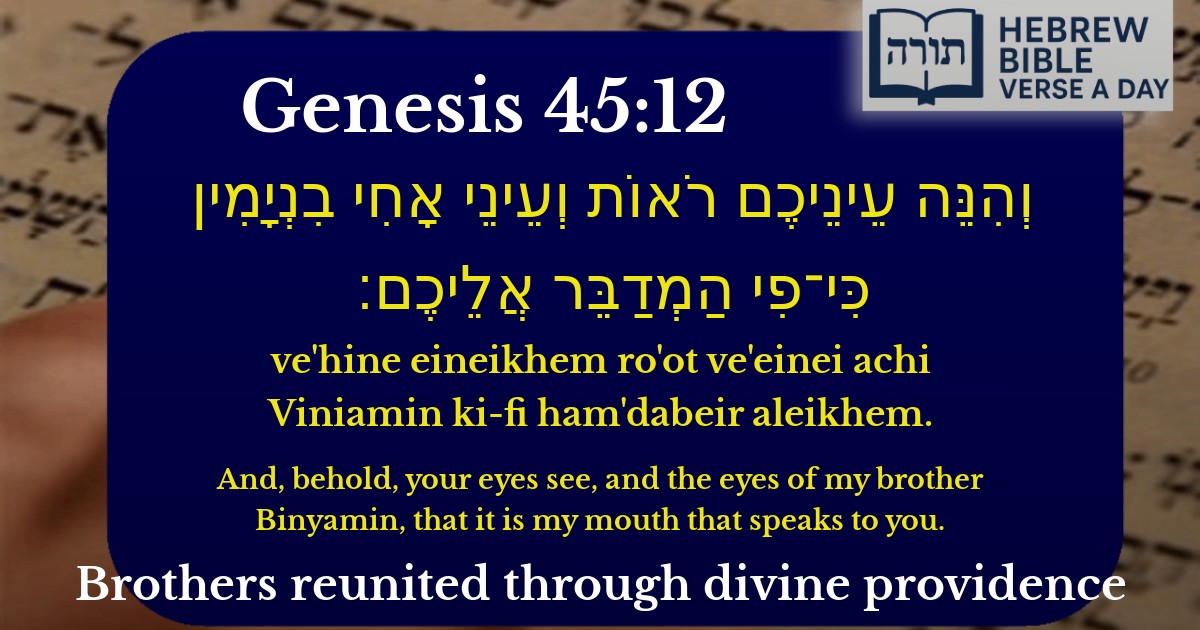Join Our Newsletter To Be Informed When New Videos Are Posted
Join the thousands of fellow Studends who rely on our videos to learn how to read the bible in Hebrew for free!
Hebrew Text
וְהִנֵּה עֵינֵיכֶם רֹאוֹת וְעֵינֵי אָחִי בִנְיָמִין כִּי־פִי הַמְדַבֵּר אֲלֵיכֶם׃
English Translation
And, behold, your eyes see, and the eyes of my brother Binyamin, that it is my mouth that speaks to you.
Transliteration
Ve'hine eineikhem ro'ot ve'einei achi Viniamin ki-fi ham'dabeir aleikhem.
Hebrew Leining Text
וְהִנֵּ֤ה עֵֽינֵיכֶם֙ רֹא֔וֹת וְעֵינֵ֖י אָחִ֣י בִנְיָמִ֑ין כִּי־פִ֖י הַֽמְדַבֵּ֥ר אֲלֵיכֶֽם׃
וְהִנֵּ֤ה עֵֽינֵיכֶם֙ רֹא֔וֹת וְעֵינֵ֖י אָחִ֣י בִנְיָמִ֑ין כִּי־פִ֖י הַֽמְדַבֵּ֥ר אֲלֵיכֶֽם׃
🎵 Listen to leining
Parasha Commentary
📚 Talmud Citations
This verse is not quoted in the Talmud.


Context in the Torah
This verse (Bereshit 45:12) appears during Yosef's emotional revelation to his brothers in Egypt, where he discloses his true identity after years of separation. Yosef seeks to convince his brothers that he is indeed their long-lost brother by emphasizing that they can see with their own eyes—and through Binyamin's presence—that it is truly him speaking.
Rashi's Explanation
Rashi (Rabbi Shlomo Yitzchaki) comments that Yosef specifically mentions Binyamin because Binyamin was not involved in selling him into slavery. Therefore, Binyamin's presence serves as an impartial witness to Yosef's identity. Additionally, Rashi notes that Yosef spoke to them in Hebrew (לשון הקודש), proving his lineage, as Egyptians would not have known the holy language.
Ibn Ezra's Insight
Ibn Ezra (Rabbi Abraham ibn Ezra) highlights that Yosef's mention of "your eyes see" is a call for empirical verification. The brothers could physically observe that Yosef was the same person they had known, and Binyamin—who shared a mother with Yosef (Rachel)—would recognize familial resemblance, further confirming his identity.
Midrashic Interpretation
The Midrash (Bereshit Rabbah 93:10) elaborates that Yosef showed them his circumcision (ברית מילה) as proof of his Israelite identity. Since Egyptians did not practice circumcision at that time, this would have been undeniable evidence. The mention of Binyamin is significant because, as Rachel's other son, he shared this covenantal sign with Yosef.
Rambam's Psychological Perspective
Rambam (Maimonides) in his philosophical works emphasizes the human need for certainty. Yosef understood that his brothers would struggle to believe such an improbable reunion. By invoking their sight and Binyamin's recognition, he provided sensory and emotional proof to overcome their skepticism.
Practical Lessons